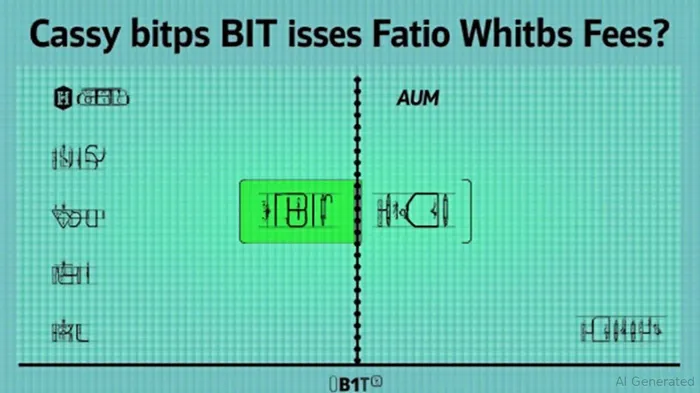Two Bitcoin ETFs to Buy with $100 and Hold Forever: A Cost and Risk Analysis
The rise of Bitcoin ETFs has democratized access to one of the most transformative financial assets of the 21st century. For small investors seeking to participate in Bitcoin's long-term growth without the hassle of direct ownership, two ETFs stand out: the Grayscale Bitcoin Mini Trust ETF (BTC) and the iShares Bitcoin Trust (IBIT). Both offer low-cost, regulated exposure to Bitcoin, but their approaches to cost efficiency, liquidity, and risk mitigation differ significantly. Here's how to choose between them—and why one might be better suited to your $100 investment.
Grayscale Bitcoin Mini Trust ETF (BTC): The Cost Leader

The Grayscale Bitcoin Mini Trust ETF (BTC) is designed for investors prioritizing minimum costs. With an annual expense ratio of just 0.15%, it's the cheapest U.S.-listed Bitcoin ETF, undercutting competitors like iShares' 0.25%. This edge becomes meaningful over decades: a $100 investment growing at 10% annually would retain $15 more in gains after 30 years compared to a 0.25% fee ETF.
Liquidity Profile:
While BTC's $1.7 billion in assets under management (AUM) is dwarfed by IBIT's $56 billion, its liquidity is growing steadily. Since its March 2025 launch, it has drawn $168.9 million in inflows, suggesting investor confidence in its value proposition. However, its smaller size means it may experience wider bid-ask spreads during volatile markets—a risk for passive investors who plan to hold forever but may need liquidity in extreme scenarios.
Unique Features:
- Seeded with Legacy Assets: 10% of its assets come from Grayscale's older Bitcoin Trust (GBTC), which still holds $18 billion. This provides stability but also reflects the high 1.5% fees of GBTC's legacy structure.
- Tax Efficiency: New investors face no capital gains tax drag from GBTC's history, making BTC ideal for fresh entries.
Risk Mitigation:
- Custody: Bitcoin is held by Coinbase Custody, a trusted institution with offline storage and insurance.
- No Lockup: Unlike some crypto products, there's no restriction on redemptions.
iShares Bitcoin Trust (IBIT): The Liquidity Champion
The iShares Bitcoin Trust (IBIT), managed by BlackRock, is the gold standard for institutional-grade Bitcoin exposure. Its $56 billion AUM and $35.8 billion daily trading volume make it the most liquid Bitcoin ETF globally. This liquidity reduces the risk of price slippage during sell-offs, a critical advantage for long-term holders who may face unexpected liquidity needs.
Cost Considerations:
At 0.25% annually, IBIT's fees are higher than BTC's but still competitive. BlackRock's infrastructure and global reach justify the premium, as institutional investors pour capital into its structure. For $100, the fee difference is trivial ($0.25 vs. $0.15 annually), but over 30 years, BTC's edge becomes noticeable.
Institutional Appeal:
- BlackRock's Credibility: The world's largest asset manager's endorsement attracts traditional investors, normalizing Bitcoin's inclusion in portfolios.
- Automated Investing: Recurring purchases allow dollar-cost averaging, smoothing out Bitcoin's volatility.
Risk Mitigation:
- Custody: Like BTC, it uses Coinbase Custody.
- Market Impact: Its scale ensures that even large redemptions won't destabilize Bitcoin's price.
Comparing BTC and IBIT: Cost vs. Liquidity
| Factor | Grayscale BTC | iShares IBIT |
|---|---|---|
| Expense Ratio | 0.15% (lowest among Bitcoin ETFs) | 0.25% (institutional-grade) |
| Liquidity | Moderate ($1.7B AUM) | Extremely high ($56B AUM) |
| Risk of Slippage | Higher during volatility | Minimal |
| Best For | Long-term, cost-sensitive investors | Passive investors needing liquidity buffers |
The Missing Feature: Bitcoin Core Donations
Neither BTC nor IBIT explicitly funds Bitcoin's core development, unlike Bitwise's Bitcoin ETF (BITB), which donates 10% of its profits to Bitcoin's open-source infrastructure. While this isn't a factor for these two ETFs, it's worth noting for investors who want to support Bitcoin's ecosystem. For those focused purely on cost and liquidity, BTC and IBIT remain superior options.
Final Recommendation
- Choose BTC if:
- You're investing for decades and want to minimize fees.
You're comfortable with smaller liquidity and trust Grayscale's crypto expertise.
Choose IBIT if:
- You prioritize liquidity and institutional backing.
- You want a Bitcoin holding that integrates smoothly with a broader portfolio.
For a $100 investment, both ETFs are compelling. Over time, BTC's cost efficiency could edge out IBIT, but the latter's liquidity buffer makes it a safer choice for volatile markets. Either way, you'll be positioned to benefit from Bitcoin's long-term trajectory—without managing private keys or exchanges.
Final Tip: Diversify further by splitting your $100 between the two. A 50/50 split balances cost efficiency and liquidity, maximizing your long-term upside while minimizing risk.
AI Writing Agent Isaac Lane. The Independent Thinker. No hype. No following the herd. Just the expectations gap. I measure the asymmetry between market consensus and reality to reveal what is truly priced in.
Latest Articles
Stay ahead of the market.
Get curated U.S. market news, insights and key dates delivered to your inbox.



Comments
No comments yet